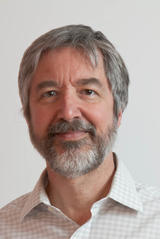Timothy Nelson
Professor of Molecular, Cellular, and Developmental Biology
 Tim Nelson, B.A. University of California, San Diego 1974; Ph.D. Stanford University 1980, faculty member at Yale since 1984, you have employed powerful techniques in genetics, molecular biology and physiology to reveal the intricate details of how plant leaves develop and how light and other signals affect this elaborate process. Through your analyses, you have uncovered a coordinated process by which many kinds of cells work together to form the fine scale structures of leaf tissues. Since these developmental processes are ruled by the molecules in individual cells, you utilized lasers to begin painstakingly capturing and analyzing more than 100 cell types—one at a time!
Tim Nelson, B.A. University of California, San Diego 1974; Ph.D. Stanford University 1980, faculty member at Yale since 1984, you have employed powerful techniques in genetics, molecular biology and physiology to reveal the intricate details of how plant leaves develop and how light and other signals affect this elaborate process. Through your analyses, you have uncovered a coordinated process by which many kinds of cells work together to form the fine scale structures of leaf tissues. Since these developmental processes are ruled by the molecules in individual cells, you utilized lasers to begin painstakingly capturing and analyzing more than 100 cell types—one at a time!
In some plants, leaf structures are adapted for survival in high light and high temperature. As humanity faces crises in our supplies of food and energy, due to growing population and climate change, understanding how to exploit the photosynthetic adaptations you have explored is becoming ever more critical. You have been the recipient of a 8.4 million grant by the Plant Genome Research Program of the National Science Foundation to investigate the molecular basis of C4 type photosynthesis and are leading a team of researchers from Yale, Cornell, Boyce Thompson Institute, Danforth Center, and Iowa State to study the development of the leaves of maize, which uses photosynthesis and the development of the leaves of rice, which does not. It is certain that future plant breeders and genetic engineers will stand on your research findings to address these emerging challenges.
Through your broader efforts you have made us aware of the critically important role that plants play in our lives, from ornament to providing our food and fuel. As an educator, you have led the way in informing our community about how to maintain sustainability in our agricultural system and how new biotechnology breakthroughs affect us all. You created “An Issues Approach to Biology”, a popular undergraduate course that teaches the fundamentals of biological sciences and discusses their links to major ethical issues including the use of genetically modified organisms and human cloning. Annually, nearly 300 students benefit from this class – and many future leaders in government, business and society will be skilled in thinking deeply about biotechnology advances and emerging ethical dilemmas.
Selfless service to the University is another inspiring legacy for which we owe you. You have been a wonderful director of the Marsh Botanical Garden, breathing new life into this verdant space that supports research, instruction, and conviviality in our community. In gratitude for all you have done, we wish we could gather a metaphorical bouquet of papaya, banana, mango, lemon, orange, cinnamon, and vanilla plants from the marvelous Marsh Gardens and present them to you, with gratitude from ourselves and future generations of people everywhere who will benefit from the research and teaching to which you have dedicated your life.
Tribute Editor: Penelope Laurans